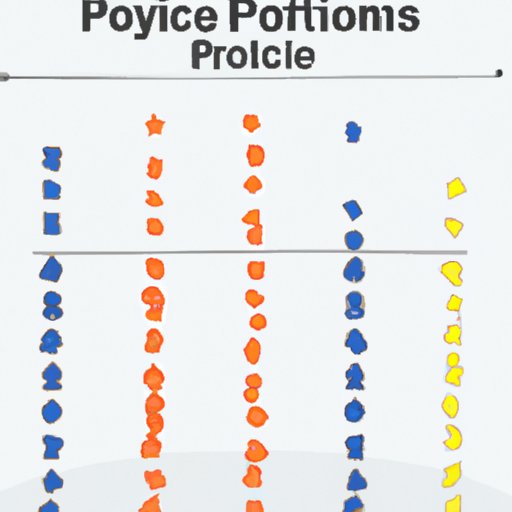Introduction
The salary of a police officer is an important topic for many people. Knowing what to expect from a career in law enforcement can help individuals make informed decisions about their future. This article will explore the salaries of police officers, including factors such as overtime pay, job benefits, and pay structures. It will also compare police salaries with those of other occupations and examine how education level impacts earnings.

Interviewing a Police Officer About Their Salary
The best way to gain insight into the salaries of police officers is to speak directly to someone who works in law enforcement. Interviewing a police officer is a great way to learn more about the salary expectations of a career in law enforcement. When interviewing a police officer, it’s important to ask questions that will give you a comprehensive understanding of their salary, including information on overtime pay, job benefits, and pay structures.
Examples of questions to ask during an interview include:
- What is your base salary?
- Do you receive any overtime pay? If so, how much?
- What job benefits do you receive?
- What is the pay structure like at your department?
Examining the Average Salaries of Police Officers Across Different States
In order to get an accurate picture of police salaries across the country, it’s important to examine state-by-state salary data. The Bureau of Labor Statistics publishes detailed salary information for police officers in each state. According to the most recent data, the average annual salary for police officers in the United States is $63,380.
When looking at regional variations in salaries, it’s important to note that salaries tend to be higher in states with higher costs of living. For example, police officers in California earn an average annual salary of $92,110, while those in New York earn an average of $86,830.
Investigating How Much Overtime Pay Police Officers Receive
Overtime pay is an important factor when considering the salary of a police officer. It’s important to understand the overtime policies and pay structures of different departments in order to get an accurate picture of overall earnings. Generally speaking, police officers are eligible for overtime pay after working a certain number of hours. For example, some departments may pay time and a half for hours worked beyond 40 hours per week.
It’s also important to understand the impact of overtime on overall earnings. In some cases, overtime pay can significantly increase a police officer’s salary. For example, a police officer in California earning an average annual salary of $92,110 could potentially earn an additional $20,000 or more from overtime pay.

Exploring How Job Benefits Impact Police Officer Salaries
In addition to salary and overtime pay, it’s important to consider the value of job benefits when evaluating the total compensation of a police officer. Most police departments offer a standard benefits package, which typically includes health insurance, life insurance, vacation time, and retirement savings plans.
It’s important to evaluate the value of these benefits when considering the overall salary of a police officer. For example, the value of health insurance and life insurance can add up to thousands of dollars over the course of a year. Additionally, retirement savings plans can provide a significant source of income in the long-term.

Analyzing the Pay Structures of Different Police Forces
Another important factor to consider when examining the salaries of police officers is the pay structure of different departments. Many police forces use a system of pay grades, which determine the base salary of an officer. Additionally, there are usually promotional opportunities available for officers who demonstrate exceptional performance.
It’s important to compare the pay structures of different police forces in order to get an accurate picture of overall salaries. For example, some departments may have higher pay grades than others, or may offer more promotional opportunities. Comparing the pay structures of different departments can help individuals decide which department is the best fit for them.
Comparing the Salaries of Police Officers With Other Occupations
In order to get a better understanding of police salaries, it’s important to compare them with the salaries of other occupations. Examining similar occupations can provide valuable insight into the salaries of police officers. For example, comparing the salaries of firefighters and emergency medical technicians can provide a better understanding of the salaries of police officers.
When analyzing the difference in salaries between police officers and other occupations, it’s important to consider factors such as experience, education level, and location. Generally speaking, police officers tend to earn higher salaries than other occupations due to the dangerous nature of their work and the specialized skills they must possess.

Investigating How Education Level Affects Police Officer Salaries
Finally, it’s important to consider how education level impacts the salaries of police officers. Generally speaking, police officers with higher levels of education tend to earn higher salaries than those with lower levels of education. For example, a police officer with a master’s degree may earn significantly more than a police officer with only a high school diploma.
It’s also important to consider the value of higher education when evaluating the overall salary of a police officer. Higher levels of education can lead to better job opportunities, higher pay grades, and more promotional opportunities. Additionally, higher levels of education can lead to increased job satisfaction and job security.
Conclusion
Police officers play an important role in our society, and the salaries of police officers are an important topic of discussion. This article has explored the salaries of police officers, including factors such as overtime pay, job benefits, and pay structures. It has also compared police salaries with those of other occupations and examined how education level impacts earnings.
In summary, police officers can expect to earn an average annual salary of $63,380. However, this figure can vary greatly depending on factors such as overtime pay, job benefits, and pay structures. Additionally, higher levels of education can lead to higher salaries and better job opportunities. Further research is needed to gain a more comprehensive understanding of police officer salaries.
(Note: Is this article not meeting your expectations? Do you have knowledge or insights to share? Unlock new opportunities and expand your reach by joining our authors team. Click Registration to join us and share your expertise with our readers.)
